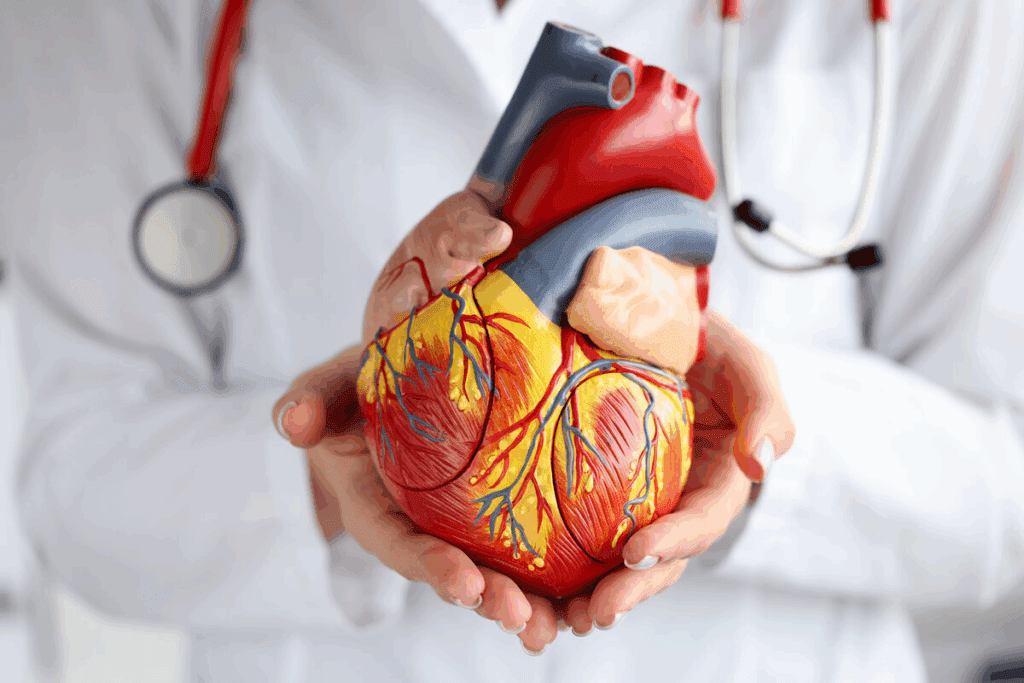Last Updated on November 25, 2025 by Ugurkan Demir

At Liv Hospital, we are committed to delivering world-class cardiac care to our patients. Congenital Heart Block (CHB) is a rare condition that affects the heart’s electrical signaling. It can cause symptoms like slow heart rate, fatigue, and shortness of breath. It’s important to recognize these signs early to get timely treatment.
Understanding CHB Heart Disease is key for both patients and doctors. We want to teach our readers about the main symptoms and warning signs of this condition. We stress the need to see a doctor if you notice these signs.

Congenital heart block (CHB) is a rare heart condition that affects the heart’s electrical system from birth. It’s important to understand this condition to see how it affects heart health and overall well-being.
Congenital heart block is a condition where there’s a blockage in the heart’s electrical system. This blockage can cause abnormal heart rhythms. Congenital heart block is present at birth, making it different from other heart block conditions.
The heart’s electrical system controls the heartbeat, making sure it pumps blood well. In CHB, the electrical signals are delayed or blocked. This leads to a slower than normal heart rate, known as bradycardia. This can make it hard for the heart to pump blood, causing symptoms like fatigue and dizziness.
Congenital heart block is rare, affecting a small percentage of people worldwide. Despite its rarity, CHB has a big impact on those affected and their families. The global health impact of CHB is significant, needing awareness and proper medical care. Understanding CHB’s prevalence and global impact is key for healthcare providers and families to get timely diagnosis and treatment.

Finding CHB heart disease early is key to managing it well and avoiding long-term harm. It’s vital to know the signs to get medical help fast.
Spotting CHB heart disease symptoms early is critical. It leads to better care and outcomes. Knowing the signs helps people get help quickly, avoiding serious problems.
Untreated CHB can cause serious issues like heart failure and dangerous heart rhythms. It can also affect other parts of the body, leading to more health problems if not managed right.
Some people are more likely to face severe CHB heart disease complications. This includes those with existing heart problems, a family history of heart disease, and other health issues that can make CHB worse.
Early detection and treatment can greatly reduce these risks. It helps improve life quality for those with CHB heart disease.
It’s important to recognize bradycardia to manage CHB heart disease well. This symptom, an abnormally slow heart rate, needs attention.
In adults, bradycardia is a heart rate under 60 beats per minute (bpm). But, athletes or very fit people might have a normal rate below 60 bpm. For others, a slow heart rate can cause symptoms like:
If you’re feeling these symptoms, see a doctor right away.
A slow heart rate is dangerous if it doesn’t give enough blood to the body’s organs. This can lead to serious problems. Signs of a dangerous slow heart rate include:
If you or someone you know has these severe symptoms, get medical help fast.
Tracking your heart rate at home can help manage bradycardia. You can do this by:
Keeping a log of your heart rate measurements can help your healthcare provider make informed decisions about your care.
Persistent fatigue and weakness are common in CHB heart disease patients. They greatly affect their daily lives. These symptoms can be hard to manage and impact their well-being a lot.
It’s important to tell CHB heart disease fatigue from other types. CHB-related fatigue is a deep, lasting tiredness that doesn’t get better with rest. It’s different from regular fatigue because it’s caused by the heart’s poor blood pumping due to CHB.
To tell if it’s CHB-related fatigue, look at these points:
Persistent fatigue and weakness deeply affect daily life and quality of life. Simple tasks become hard, and fun activities are less enjoyable.
| Activity | Impact of CHB-Related Fatigue |
| Exercise | Less stamina and endurance |
| Work | Hard to focus and finish tasks |
| Social Activities | Less able to join in because of constant tiredness |
If you’re always tired and weak, know when to see a doctor. We suggest talking to a healthcare professional if:
Understanding CHB-related fatigue helps us manage it better. This improves life quality for those affected.
Dizziness and fainting can really affect people with CHB heart disease. These symptoms can make everyday life hard. They happen because of how CHB affects the heart’s electrical system.
Syncope, or fainting, is when you lose consciousness suddenly. It’s because your heart can’t adjust its rate when you move or change position. This can cause a drop in blood pressure, leading to fainting.
Before fainting, you might feel dizzy, nauseous, or see things differently. Spotting these signs early can help you stay safe.
If you feel dizzy or faint, there are steps you can take. Avoid standing for too long and move slowly when changing positions. Always have someone nearby to help. Drinking plenty of water and staying away from extreme temperatures is also important.
Knowing why dizziness and fainting happen in CHB heart disease helps. Taking the right safety steps can make managing your condition easier. This way, you can lower the chance of getting hurt from falls or accidents.
It’s important to know about chest pain linked to CHB for quick medical help. Chest pain can mean a serious heart problem, more so for those with CHB.
Chest pain from CHB can feel different. Knowing the types helps understand how serious it is.
People with CHB might feel different kinds of chest pain. These include:
| Type of Chest Pain | Description | Possible Cause |
| Angina-like | Squeezing or pressure | Reduced blood flow to the heart |
| Sharp or Stabbing | Sharp pain, often worsening with movement | Pericarditis or inflammation |
| Dull, Aching | Constant, dull sensation | Various cardiac or non-cardiac causes |
It’s key to tell CHB chest pain from other heart issues. Myocardial infarction, pericarditis, and angina pectoris can have similar symptoms.
Key Differentiators:
Severe chest pain needs quick medical help. Call emergency services or go to the emergency department right away.
Emergency Response Steps:
Knowing how to act on CHB chest pain can really help. If you have chest pain, get medical help fast.
CHB heart disease can show other warning signs beyond the usual ones. These symptoms can really affect a person’s life. It’s important for both patients and doctors to know about these signs to manage the disease well.
Shortness of breath, or dyspnea, can range from mild to severe. It happens when the heart can’t pump enough blood. This makes it hard to breathe and is a big worry for those with CHB heart disease.
Some common signs include:
Exercise intolerance means you can’t do physical activities as well as before. This is because of symptoms like fatigue, shortness of breath, or chest pain. For those with CHB heart disease, even simple exercise can be hard.
Key indicators include:
Palpitations make you aware of your heartbeat, which might feel off. In CHB heart disease, this is because of abnormal heart electrical activity. These irregular heartbeats can be scary and might mean you need to see a doctor.
Some people may experience:
Diagnosing and treating CHB heart disease requires a detailed plan. Accurate diagnosis is key, and we use modern techniques to get it right.
Tests like electrocardiograms (ECGs), echocardiograms, and sometimes cardiac MRI are used. ECGs are critical for checking the heart’s electrical activity.
Echocardiograms show the heart’s structure and function. This helps us see how CHB impacts the heart. Sometimes, more tests are needed to confirm the diagnosis.
Pacemaker therapy is a common treatment for CHB heart disease. A pacemaker is a small device that helps control the heartbeat.
Pacemakers improve heart rate and reduce symptoms like fatigue. They also enhance quality of life. Each pacemaker is customized for the patient’s needs.
Medications are vital for managing CHB symptoms and preventing complications. They help with conditions like high blood pressure or heart failure.
We tailor medication plans for each patient. We monitor their response and adjust as needed for the best results.
Medical treatments are not the only solution. Lifestyle changes are also key for managing CHB heart disease. Patients are advised to eat well, exercise regularly, and avoid smoking.
These changes improve heart health and reduce risks. We help patients make lasting lifestyle changes.
Managing CHB heart disease well means acting early and treating it right to avoid big problems. We talked about important signs to look out for, like slow heart rate, feeling very tired, getting dizzy, and pain in the chest.
Getting help from experts is key to better managing CHB heart disease. Places like Liv Hospital provide top-notch care. They use the latest tests and treatments, like pacemakers and medicines.
Knowing about CHB and its signs helps people take charge of their health. Working with doctors, they can manage their condition well. This not only makes life better but also lowers the chance of serious issues.
We urge those with CHB heart disease to find specialized care. This ensures they get the best treatment. With proper care, people can live full and happy lives.
CHB heart disease, or Congenital Heart Block, is a condition. It affects the heart’s electrical signals. This makes it hard for the heart to pump blood well.
Symptoms include a slow heart rate and feeling very tired. You might also feel dizzy, faint, or have chest pain. Shortness of breath and trouble exercising are other signs.
Doctors use tests like electrocardiogram (ECG) and echocardiogram. These help see how the heart works and its electrical activity.
Treatment might include a pacemaker to control the heart’s rhythm. Medications and lifestyle changes are also used to help the heart.
Yes, some people manage it with a pacemaker or by changing their lifestyle. They might also take medication, under a doctor’s care.
Risks include delayed diagnosis and not getting proper treatment. Other heart problems can also increase the risk.
You can check your pulse or use a heart rate monitor at home. Pay attention to any changes in your heart rhythm or symptoms.
Seek medical help for severe symptoms like chest pain or dizziness. Also, if you notice changes in your heart rate or rhythm.
Exercise can help, but talk to a doctor first. They can create a safe plan for you based on your condition.
Changes include eating well, managing stress, and exercising regularly. Avoid smoking and drinking too much alcohol.
Subscribe to our e-newsletter to stay informed about the latest innovations in the world of health and exclusive offers!